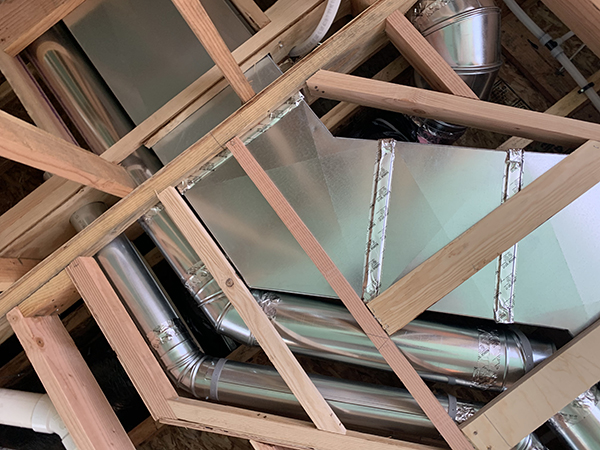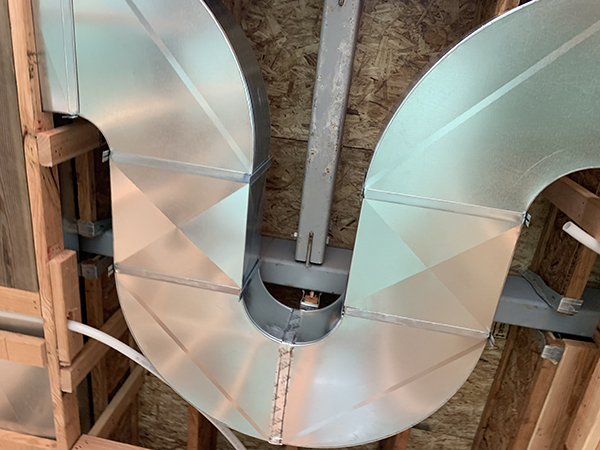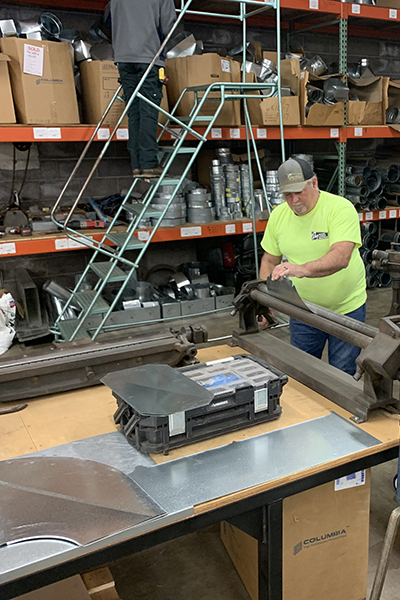
Day Heating installed this residential duct work in Salem, Oregon.
Across the United States, residential contractors have seen an increase in business as clients adjust to the COVID-19 pandemic. “Our customers are stuck at home this summer, so any problems with their HVAC systems are more evident than ever before,” explains John Zipf, president of Zipf-Air Inc. in Kirkwood, Missouri. “One customer recently spent $30,000 — three times our average order — to upgrade his home system. He said he’d worked hard all his life and had earned the right to be comfortable.”
Rick Lazzarini of Degree HVAC, Inc. in Redwood City, California agrees. “The feedback we are getting from our customers is that the climate is much warmer than they recall it being in the past, and they don’t want to tough it out anymore. Also, there are more people working from home instead of in air-conditioned offices, making dependable HVAC a requirement rather than a luxury.”
Many customers want to invest in better indoor air quality. Jim Klopfenstein of Day Heating Company in Salem, Oregon finds that sometimes they request an accessory he can’t endorse. “We want to be very careful with customers’ trust,” he says. “We don’t make any claims unless the product manufacturer makes the claim. If a customer is concerned about viruses, we only recommend products that specifically address viruses.” Fortunately, many accessories meet that standard, including UV lights, high-rated filters, hydrogen peroxide scrubbers, and ionization units.

The supply chain is struggling to keep up with high demand. “Since the factories were shut down or continue to work with skeleton crews, the pandemic has had a negative impact on the supply chain of furnaces, indoor AC coils, and condensing units,” explains Ernest G. Tricarico, owner of Skyline Heating, A/C and Sheet Metal, Inc. in Denver Colorado. Crucial parts might be on backorder for weeks at a time.
“Nitrogen seems to be in short supply around us as well,” says Scott Tucker, co-owner of Tucker Heating and Air Conditioning, Inc. in Middleton, Ohio. “Some indoor air products that we installed in the past are due for replacement cells. We ordered the cells in March, but they gave us a ship date of late August. It’s hard to tell a homeowner that we installed this ultraviolet light to help clean the air in the house, but the replacements are not available.”

Tucker Heating has seen a large jump in HVAC replacements in 2020.
Russ Kimball, owner of Evergreen State Heat and AC, in Everett, Washington, is using the current rush of business to strengthen his company’s long-term financial stability. “I’m following advice Thomas C. Schleifer, Ph.D., gave at past SMACNA conventions,” Kimball says. “We stay debt-free by owning all of our vehicles, I’ve restructured to lower our cash outflow, and I’m watching overhead in the office.” These strategies will help keep Evergreen strong no matter what happens next.
Randy Novak, president of Novak Heating and Air Conditioning in Hiawatha, Iowa, is also drawing on SMACNA to manage his business in unpredictable times. “I’ve relied on my SMACNA peers for 34 years,” he says. “I can’t replace them. We’ve always called and emailed each other about how to solve the problems we face, and for the last few months we’ve focused on coronavirus. This constant flow of ideas doesn’t just help you run your business. It brings peace of mind because you know you’re designing protocols with the best contractors out there.”
While many industries are faltering due to pandemic precautions, the residential HVAC market is growing. Across the U.S., contractors anticipate further expansion in the third and fourth quarters. “People might get by without air conditioning in the summer,” Novak says, “but they can’t do without heat in winter.”
Zipf-Air Inc »
Degree HVAC »
Day Heating »
Tucker Heating and Air Conditioning, Inc »
Evergreen State Heat and ACL »
Novak Heating and Air Conditioning »